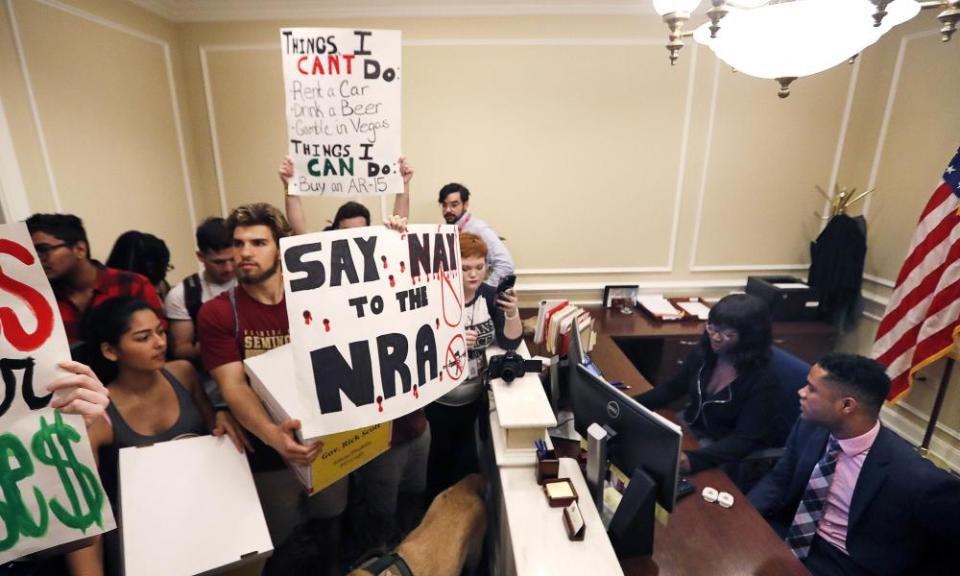Florida lawmakers pass bill allowing armed teachers in classrooms
Bill headed to governor’s desk would raise gun-buying age to 21 and increase funding for school security and mental health support

Florida’s lawmakers narrowly passed a controversial gun bill late on Wednesday that would allow armed teachers in the state’s classrooms, three weeks to the day after the Marjory Stoneman Douglas high school massacre in which 17 people were killed.
The new legislation, which must now be approved by the Florida governor, Rick Scott, also raises the age at which weapons can be purchased to 21 and provides extra money for school security and mental health support.
The package was backed by families of the Parkland victims, but strongly opposed by many Democrats, who failed to block its passage in a 67-50 vote.
It is unclear if Scott, who has also spoken out against putting guns in classrooms, will veto the bill.
“I’m going to take the time to read the bill,” Scott told reporters. “I have been clear. I don’t believe we should be arming teachers.”
Earlier on Wednesday, students at Stoneman Douglas clashed with Betsy DeVos after the US education secretary toured the school. According to at least two teenagers who were present when DeVos arrived, no students were allowed to ask her questions. One claimed DeVos refused to meet or even speak with them.
“You came to our school just for the publicity and avoided our questions for the 90 minutes you were actually here,” Aly Sheehy, a 12th-grade student and survivor of the shooting, said in a tweet. “How about you actually do your job?”
Another student, Carly Novell, the editor of the school’s newspaper, Eagle Eye, said she was allowed to photograph DeVos but not accompany her on the campus tour.
“I thought she would at least give us her ‘thoughts and prayers’, but she refused to even meet/speak with students,” Novell said in a tweet. “I don’t understand the point of her being here.”
DeVos’s visit to the Parkland school was closed to the press, and came on the first full day of lessons for students since the 14 February massacre that claimed the lives of three teachers and 14 of their classmates.
The final vote in Florida’s house of representatives late on Wednesday followed hours of intense debate, and marks the first time in 22 years that the state legislature has approved any kind of gun control measure.
The measure would outlaw the sale of so-called bump stocks, which give semi-automatic weapons firepower similar to automatics and will allow certain school personnel, including librarians, administrators and other support staff, to be armed, following Donald Trump’s repeated calls for some teachers to carry guns.
However, a ban on assault weapons such as the AR-15 used by the Parkland shooter, one of the main demands of the #neveragain movement set up by Stoneman Douglas students in the aftermath of the massacre, was missing from the proposed legislation.
A final vote in Florida’s house of representatives was expected later on Wednesday.
DeVos spoke briefly with reporters after what she said was “a very sobering and very inspiring visit” and contradicted the students’ account of the meeting.
“There were a number of student newspaper reporters who walked around with me and they are obviously very interested in seeing what adults are going to do about this whole situation,” she said.
“I give a lot of credit to the students here who have found their voices and encouraged them to continue to speak out about finding these solutions and having adults pay attention.”
DeVos also addressed the controversial issue of allowing teachers to carry weapons. As a concession by state lawmakers to Scott’s stance, the legislation does not put guns in the hands of teachers whose sole responsibilities lie in the classroom, but permits those who have additional or separate non-teaching roles to carry a concealed weapon. It also leaves the final decision of allowing armed staff up to the school board in each of Florida’s 67 counties.
“To say ‘arming teachers’ is an oversimplification and a mischaracterisation, really,” DeVos said. “The concept is for those schools and those communities that opt to do this, as they have in Texas, as they have in Polk county and other places around the country, to have people who are expert in being able to defend and having lots and lots of training in order to do so.
“That’s a model that can be adopted and should be an option, but certainly not one that needs to be required and mandated.”
DeVos was referring to a “sentinel” programme set up in Florida’s Polk county by Sheriff Grady Judd, in which volunteers in private educational establishments can carry weapons after extensive training.
The families of the Parkland victims wrote a joint letter to Florida’s lawmakers on Tuesday urging them to pass the $400m legislation.
“You must act to prevent mass murder from ever occurring again at any school,” they wrote in a letter signed by at least one relative from all 17 families. “This issue cannot wait. The moment to pass this bill is now. We must be the last families to suffer the loss of a loved one due to a mass shooting at a school.”
Prosecutors announced on Wednesday that Nikolas Cruz, a 19-year-old former Stoneman Douglas student, had been indicted on 34 charges related to the shooting, 17 each of first-degree murder and attempted first-degree murder.
Cruz, who is being held in solitary confinement in the Broward county jail, had already been charged with murder but the formal grand jury indictments allow state attorneys to progress the case against him and potentially seek the death penalty.
Cruz’s public defender has said Cruz will plead guilty and avoid a trial if prosecutors take the death penalty off the table, an offer to which they have yet to respond.
The Associated Press contributed to this report

